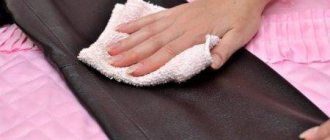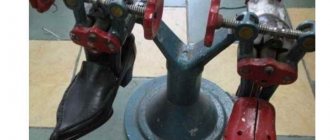A watch is an accessory that is still very relevant and has not lost its popularity in our time, despite the fact that now everyone can find out what time it is on their smartphone.
After all, in addition to its direct purpose, a watch is an indicator of the status of its owner. But in order for mechanical watches to show accurate time and work properly, they need to be cleaned 2-3 times a year. If you cannot use the services of a professional watchmaker, we will tell you how to clean a mechanical watch at home.
What do you need to clean your watch?
First of all, you need a workspace with good lighting.
Materials for work:
- - medical rubber bulb;
- — tweezers, for working with small parts;
- - pipette;
- - toothpicks;
- — a brush with thin and soft bristles, pre-soaked in gasoline or alcohol;
- - a toothbrush, also pre-soaked;
- - ethanol;
- - watch oil;
- - small capacity;
- - cotton pads and buds;
- - fabric napkins;
- - clean white sheets of paper;
- - birch sawdust;
- - soft, lint-free fabric.
Faux leather
- A good place to start is to clean the dirt off your strap using soapy water. You can also try dishwashing detergent, which is best diluted with water. In our case, you can use brushes, but not with very hard bristles. The product can also be soaked in water if the stains are old and require more thorough cleaning.
- You can try cleaning light-colored straps with chlorine-free substances, which are used in everyday life for cleaning tiles and plumbing fixtures. Do not forget to protect your hands, as well as take precautions when working with chemical compounds. Use brushes, cotton swabs, sponges and whatever you want to bring the color of the strap closer to its original state.
- Stationery eraser. I'm not kidding. Sometimes such a simple effect is enough for simple pollution.
- Nail polish remover (cosmetology, not construction chemicals). In practice, this remedy also helped, but here you need to experiment, depending on the type of contamination and the condition of the rubber.
So, cleaning a mechanical watch is carried out in the following sequence .
Sequence of work
In order to do a good job of cleaning your watch, you need to follow a certain algorithm of actions. First of all, clean the body, and then the remaining parts.
Parsing the device
Before cleaning the inside of your watch, you will need to disassemble the movement. First, remove the crown, which secures the mechanical parts of the device inside. Then the watch is opened and the mechanism is taken out. The extracted parts are then placed on a cloth napkin.
Cleaning the case
Using a medical blower, we clean the case from dust. Then we process the glass with a soft cloth. We clean the remaining elements of the body with cotton swabs soaked in alcohol. If there are complex stains, use a toothbrush. Then wipe the dial first with a damp cloth, then with a dry one.
Cleaning the mechanism
Cleaning the mechanism requires careful actions, excluding strong pressure on the parts to prevent their deformation.
Sequence of work:
— We start with the balance, which we first immerse in a container with alcohol or gasoline. To do this, you need to take the balance by the rim, immerse it in a container a couple of centimeters, then rinse it, move it through the air, thus allowing the alcohol or gasoline to evaporate. After that, we place the balance in birch sawdust, which will finally absorb all the liquid.
- — To clear the hangar, you will need to do the same manipulations as with the balance. But they dry it on a clean sheet of paper.
- - All other parts are cleaned in the same way; in order to dry large parts, sawdust is used, small parts - a sheet of paper.
- — Only after all the parts have completely dried do we begin assembling the mechanism. You need to collect as quickly as possible to prevent dust from entering.
- — at the end of assembling the parts, it is necessary to lubricate the parts with chalk using a pipette and immediately insert them into the body.
Cleaning a strap or bracelet
The strap or bracelet is an integral part of an outdoor watch. They are made from various materials: from traditional metal, leather to ceramics, plastic and silicone, etc.
To clean the strap/bracelet, you must remove it from the watch.
To clean a ceramic bracelet, you need to wipe it with a soft cloth moistened with glass cleaner.
Leather and silicone straps are cleaned using a cotton pad, which must be moistened in a soap solution, to which a drop of ammonia is added. After which the soap scum is removed with a damp cloth.
Important: do not soak a leather strap, or clean it with gasoline or alcohol!
It is recommended to clean light or white leather with a mixture of milk and egg white.
We recommend cleaning plastic, rubber or fabric straps with toothpaste or a solution of laundry soap.
It is recommended to clean a stainless steel bracelet with a mixture of table vinegar and soda, or ammonia and soda.
We recommend cleaning your silver bracelet with shampoo or dishwashing detergent and then wiping it dry with a soft, lint-free cloth.
A gold bracelet can only be cleaned with baby powder, crushed chalk or powder; they polish the product on both sides and then wipe it dry with a cloth.
What are watch bracelets made of?
We hasten to please you, dear readers, with the fact that the times when even very well-known watchmakers widely used such ultra-low-cost alloys as brass and alloy for the manufacture of watch bracelets are practically a thing of the past. Not very durable in maintaining a presentable appearance due to the rubbing of the protective coating during active use, such bracelets, in addition to this, also began to oxidize on the inside. As a result, dark stains appeared on the wrist, which did not look aesthetically pleasing and also stained the light cuffs of the shirts. We remember and tell you about this for a very practical purpose, in order to reasonably dispel idle slander about such defectiveness, supposedly universally inherent in any of the metal bracelets. Well, with the possible exception of gold ones.
So, from the most popular bracelets made of stainless steel, titanium alloy or high-tech ceramics today, if some darkening appears on the wrists, especially in the summer months, then this is only and exclusively due to the significant contamination of these bracelets. Indeed, in recent years, most watch manufacturers have been using low-allergenic stainless steel 316L or its closest analogues even for their inexpensive models. And since this steel is used in jewelry and even in the medical field, it is completely unlawful to blame the unworthy quality of watch bracelets made from it. The same applies to watch bracelets made from titanium alloys, known for their hypoallergenic properties, and high-tech ceramics, the former of which are also 40% lighter than steel, and the latter are distinguished by super-hardness, and therefore increased resistance to scratches.
Therefore, since the bracelets get dirty, you need to learn how to clean them! And quite naturally, the more regularly you do this, the less chance you will have of getting your wrist dirty, and you will be guaranteed to have an impeccably presentable appearance.
How to remove odor from a bracelet/watch strap
If a person often wears a watch without cleaning it from dirt, pathogenic bacteria and sweat accumulate on the strap.
The waste products of these microorganisms emit an unpleasant odor, the following method will help you get rid of it:
- — rub the inside and then the outside of the strap with baby soap;
- — moisten cloth napkins in warm water and wipe the bracelet;
- - wipe dry with a napkin and leave on a clean cloth until completely dry.
Prologue
I absolutely hate buying new things, especially when I have to choose between Chinese and Turkish consumer goods of the lowest quality. Maybe that's why my family still uses Soviet-made mechanical and electromechanical watches.
Throughout the life of this watch, I cleaned and lubricated it several times. But, each time the result was worse and worse.
I lubricated the watch with MTs-3 and MBP-12 oils, which I got hold of when I was still working in production.
MC-3 oil is used to lubricate the journals of large gears, and MBP-12 oil is used for the most delicate parts of the watch mechanism - the balance supports and the anchor mechanism, as well as the pallets and impulse stone of the latter.
The trouble is that after fifteen to twenty years of storage, watch oils change their properties so much that watches lubricated with them either barely breathe or do not start at all. This is exactly the fate that befell my 1973 oils. It got to the point where only one clock continued to run.
Of course, I played it safe and, with the help of good friends, got some fresh oil (in the picture on the right), which, as I was told, was similar in properties to MBP-12. I didn’t want to buy a whole bubble over the hill for $100, not including postage.
Well, since the last clock stopped yesterday, today I decided to check the performance of this oil.
The balance pins, lubricated on top of the old grease, made it possible to spin the pendulum to its fullest extent with half a kick. Hooray! Now you can safely clean and lubricate all watches.
Watch care rules
In order for a watch to serve for a long time, it requires regular and proper care:
- — avoid getting moisture into the mechanism;
- — clean the glass, case, bracelet/strap from dirt;
- - protect from sudden changes in temperature;
- — do not allow mechanical watches to be impacted; take them to a workshop for cleaning every two years.
- — quartz watches should not be worn in hot weather, they are subject to overheating, and as a result, the batteries deteriorate;
- — avoid electromagnetic radiation, otherwise the watch may slow down or stop;
- — leather and rubber straps cannot withstand heat; they must be treated with a special compound that prevents them from getting wet from contact with water.
As we can see from the article, in order to clean your watch without ruining it, you will need to work hard. Especially if you have no experience working with small mechanisms. Therefore, you can take a risk and try to clean it yourself using the above tips or contact a professional workshop.
What metals are used now?
If earlier watch manufacturers did not hesitate to use, frankly speaking, budget alloys of metals such as alloy or brass, today almost all brands have moved away from this practice. Why? Yes, because these alloys were never distinguished by their durability, their reliability suffered and their appearance quickly deteriorated. Another serious problem with these materials is rapid oxidation, which not only spoiled the visual appeal of the products, but also rendered them unusable. Also, traces of oxidation quickly transferred to the cuffs of clothing, which was also not very good.
Today, stainless steel, ceramics and titanium have replaced them. At the same time, a wide variety of steel alloys makes it possible to produce bracelets of any cost, so now steel can be seen almost everywhere. In more expensive models, where the emphasis is already placed on maximum strength and lightness, titanium and special ceramics are used. In addition, the last two options are very resistant to scratches and various mechanical influences, and therefore are durable in use.
How can you clean steel?
Dilute white vinegar in water in a ratio of 1:5 and wipe the sink with a microfiber cloth soaked in the solution, and then rinse with clean water. Clean and polish stainless steel in a circular motion to give it an extra shine.
Interesting materials:
Why do the light bulbs in a chandelier get hot? Why don't they grow mushrooms? Why did mushrooms turn purple after cooking? Why do milk mushrooms turn black when cooked? Why do my bike brakes buzz? Why is the air conditioner humming when it's turned off? Why does Google say it can't access the site? Why do geese fly in a triangle? Why and when did St. Petersburg become the capital? Why and why?
How to clean the internal mechanism
Any wrong action may damage the watch. When disassembling an accessory, you need to remember where this or that part was placed and in what sequence the elements were removed. To clean the mechanism:
- Large deposits are removed with a thin needle.
- Separate the angrenage, balance, and anchor fork with tongs and place them in a container filled with alcohol.
- After 3 or 4 minutes, all parts are removed from the solution and dried on tissue paper.
- Mineral oil is taken into a pipette and each part is treated.
If dirt remains, remove it with a brush, moistening it in ethyl alcohol. After finishing cleaning, the mechanism is immediately reassembled, otherwise dust will settle on it.
How to clean gold plated earrings
First, remove all dust from the surface, then wipe the product with a cloth soaked in alcohol or turpentine. Ordinary ammonia or a solution of Marseilles soap is also suitable for cleaning gold-plated earrings.
Gold has always been one of the most expensive metals. Even now, when almost every family has gold jewelry, wearing gold remains a sign of solidity and a successful financial position.
It is not uncommon to find people who love gold jewelry for no reason. Not because of their value, but precisely because of their appearance. Some people think that gold items are best suited for them, while others, on the contrary, insist that it is better to wear silver and other metals.
Preparatory activities
Wearing an accessory with a precise mechanism allows you to confirm that its owner is responsible and punctual.
For a wristwatch to look presentable, the strap should also look well-groomed. The skin must be protected from moisture and ultraviolet rays. The material absorbs dirt and fat secreted by the sebaceous glands, collects dust, which contributes to the appearance of an unpleasant odor and accelerates wear. At least once a week, the leather strap should be wiped with a damp material. Before cleaning, the item must be detached from the watch case to prevent detergents from getting into the mechanism.
Disassembly
The strap is held in place by a pin. Inside such a hollow tube there is a spring and 2 tips, one of them secures the product to the body. To remove the strap from a mechanical watch, you need to move the pin to the side. To do this, use a needle or a thin knife blade to pick up the tip by the corner and push the tube inside.
After cleaning the leather, the pin is again inserted into the strap; the first tip must be inserted into one hole, which is located on the watch case, and the second into the other.
Traditional methods
The people came to us with advice to clean gold with peroxide, ammonia, soda and even lipstick.
It is believed that unstained wine vinegar helps get rid of dirt. Vinegar is applied to the surface of the gold product using a soft brush, after a couple of minutes the liquid is washed off with water and left to dry.
Forget about the recommendations to clean gold with soda or powder, they will only scratch the accessory.
Do you like guys with long hair?
Not really
You need to be careful with folk methods - their effectiveness has not been confirmed by experts, so the owner of a gold watch or jewelry does everything at his own peril and risk. Just rinse the products with water as we described above, and in case of serious contamination, contact a professional.
How to clean your watch from dirt and dust at home
When disassembling alarm clocks and other large clocks, no special tools are required. A tool that is used to repair small electronic equipment is suitable.
Expert opinion
Ekaterina Korneva, expert in the field of care, cleanliness and beauty
I will help you understand all the intricacies.
The polishing method for a mineral watch glass is different from that of a sapphire glass, for example, so you need to keep this in mind. Salt, which is probably found in every home, is also used to clean gold from dark deposits. How to clean a yellow metal watch. How to clean a Pandora bracelet at home. Features of cleaning a watch strap If you have any questions, please contact me, I will be happy to answer!
Reassembly
The washed parts are blown with air from a medical bulb, after which the drum is taken with tweezers and secured to the platinum. Then install the wheels of the mechanism, check the adhesion between them and their position relative to the axis. Screw on the anchor and bridge, tighten the spring. They attach the second hand, then the minute hand, fix the levers - factory and transfer, install the dial, balance, and spiral.
The assembled mechanism is put into the case, the shaft that starts it is returned to its place, and the back wall is screwed on.
How to determine what alloy a piece of jewelry is made of?
Before you begin to rid the product of blackness, you need to determine what it is made of. The most commonly found material is an electroplated alloy. It could be as follows:
- cupronickel Contains nickel, manganese, iron and copper. The product looks like silver;
- nickel silver – copper, zinc and nickel. If the content of the latter is high, the decoration becomes white with a blue or green tint and practically does not rust;
- pewter. It is based on tin. Nickel and lead are absent in such jewelry. Mostly their coating is gold or silver plated;
- brass. Consists of zinc and copper. Brass jewelry has a yellowish tint;
- bronze. It is based on copper and tin.











